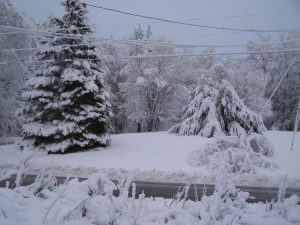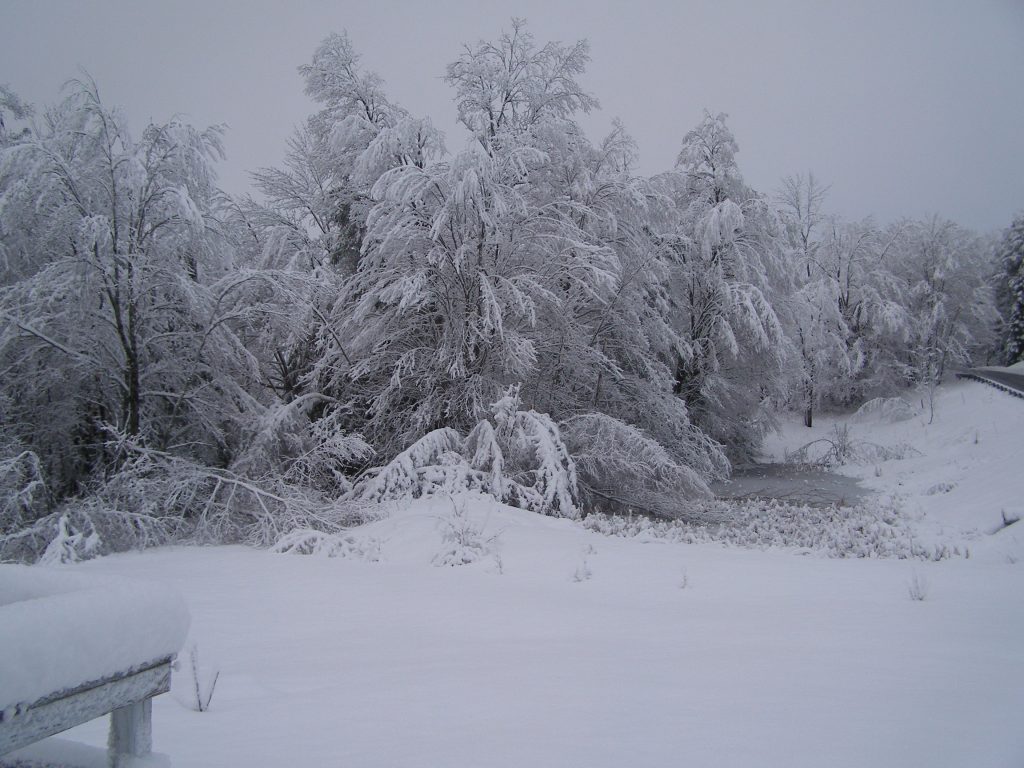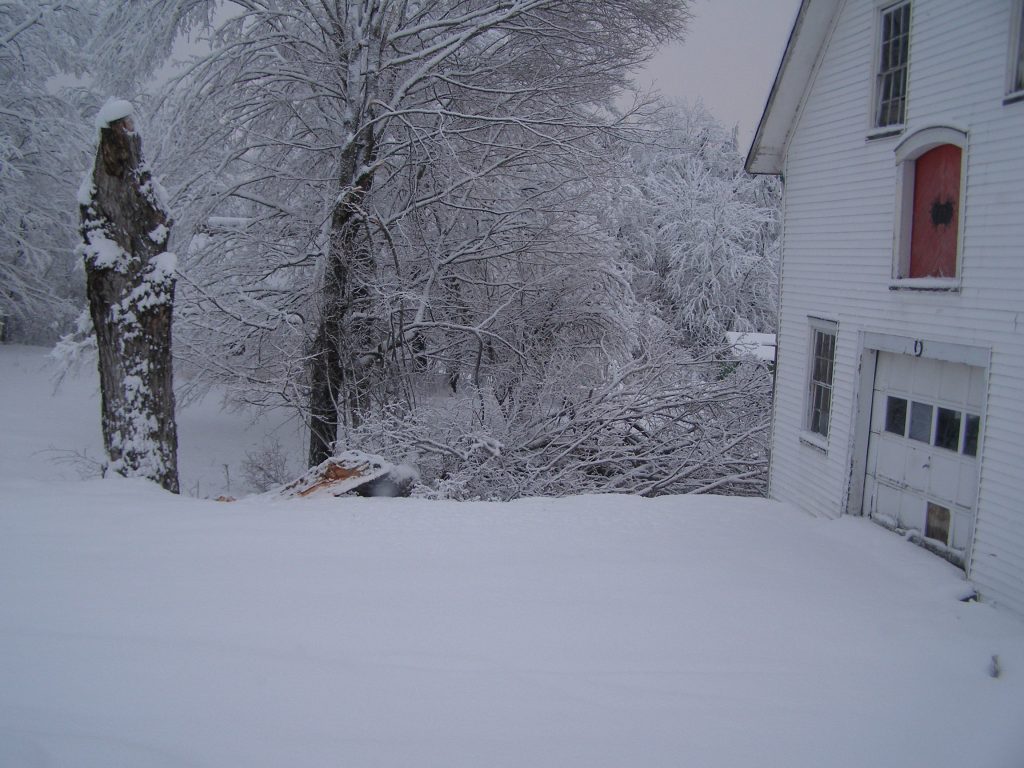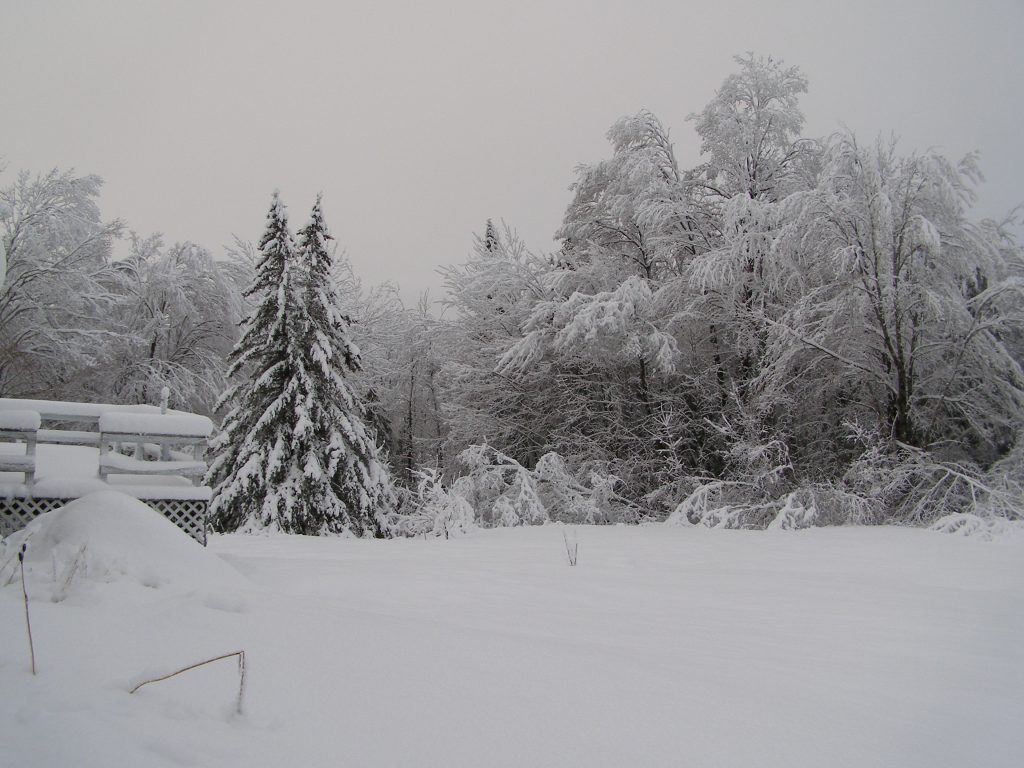Thursday morning, I went to town with my mask, met one of our egg suppliers and bought several dozen eggs, visited the grocery store and thanked the young man sanitizing grocery carts and controlling the number of people allowed inside. One of my sons is doing the same work in Denver, and as I went back to the car with loaded plastic grocery bags dangling from my hands, I thought of him.
On the way home it began to rain.

An hour later, snow was falling in thick, wet clumps, filling the air and coating every surface it touched.
Six hours later, as night fell, we had several inches of snow and the air swirled with flakes, smaller and harder now as the warmth of the day faded. The power began to flicker as we watched TV. We turned off our computers and unplugged them.
At bedtime, I cracked a window open and crawled under the covers to read. The power stuttered over and over, making our carbon monoxide detector beep and my office electronics in the adjoining room click and clack.
I turned out the light and thought of the smothering weight of the snow on the roof above me, how quickly it was accumulating and how typical that an April storm just before Easter would be the worst of the season. Plows passed by, their lights shining through my unshielded windows, illuminating my room in flashes and moving stripes of light.
Sometime around 10:00 p.m. the power went out for good. The house was abruptly silenced, but the night outside was filled with sound and movement. The storm was like an immense creature padding around the house, breathing in erratic gulps, thumping, pawing, scrabbling. The trees groaned and soughed in their wooden throats, the merciless blanketing snow pressing down on their bodies and limbs.
At 12:40 a.m. a long, slumping crash filled the night. I lay, tense and fearful, listening. Was that part of our roof? Had the deck torn away from the house? I turned on my small LED reading light, thrust myself into robe and slippers and went downstairs.
Dark. The lights we usually leave on in the kitchen and living room were out, of course, along with the bathroom nightlight. Outside the large window over our dining table, nothing but soft, formless white, except for a great black shadow between the barn and the trunk of a 200-year-old maple alongside the driveway.
A black shadow, taller than a man and longer than a car. A black shadow in a white night. I strained to see clearly, but it was impossible to make out any details. I let my eyes move up the tree trunk. Was the top of the tree still there, or had it fallen away?
I went back up the stairs, feeling sick and pretty sure we’d lost the tree. Had it hit the barn? If so, there was nothing I could do about it.

I lay in bed, listening to the storm and the beleaguered forest. It was like a battle between the violent, inexorable snow and the patient, giant trees. Creaks, cracks, booms, explosions, and the muffled sound of crashes and heavy bodies falling filled the night. I knew some of what I was hearing was transformers blowing and electrical noise, but I couldn’t tell how much. I wept for the trees as the storm rent and tore at them, bearing them down with its cold, white weight.
I checked my small battery-operated clock at 3:30 a.m. Dawn was not far away. I felt calmer, and now I heard only the hush of heavy snowfall. The weight on the roof above my head felt less ominous. I blew my nose, flipped over my pillow and turned onto my side, finding sleep at last.
At 6:30 a.m., my partner and I looked out the front window at the shattered maple, which had fallen onto an old apple and snapped it like a toothpick, as well as tearing all the limbs off one side of a younger, healthier maple near it. The fallen tree did not hit the barn, or our cars, or the house.

Fourteen inches of heavy snow had fallen, and it was still snowing, though lazily. We went from window to window, seeing trees split, snapped and torn in every direction. Several had fallen across our pond. Our favorite swamp maple, every year the earliest to turn and the most intensely colored, had split down through the trunk, each heavy branch peeling away like a banana peel until it rested on the ground. Shrubs, branches and wires hung flat and low, bowed with the terrible weight of the clinging snow. Many trees were broken but still clasped in the arms of their neighbors.
My partner called the power company on his cell and got a recorded message saying the estimated time of power returning was 11:15 p.m. the day before! Not encouraging.
We spent most of the day in the living room, near the wood stove, each with a blanket and a book. Clouds surged across the sky, bringing periods of heavy snow interspersed with lighter showers. Plows and sand trucks went by, but we saw no tree service or power trucks. We boiled water on the wood stove for tea, scrambled eggs, heated soup, fed the fire. I felt thick-headed and wretched — too much crying, too much devastation, too little sleep. We had no power; no Internet; no more than a trickle of water, inadequate to flush the toilet. Our cell phones were not fully charged.
I felt utterly cut off and isolated, and too tired to make any sensible plans to help myself.
Before it was fully dark, I went to bed, lit a candle, and reread Rosamunde Pilcher, the most comforting author I know. After blowing out the candle, I lay absorbing the quiet. The storm was over. The injured, dead and dying trees were silent, now beginning the long work of rotting or healing. I knew we had months of work in front of us, too, with chainsaw, hatchet, splitter and wheelbarrow. We will not need to buy firewood this summer.
I turned onto my side and fell into a dark well of sleep.

© 2020 – 2022, Jenny Rose. All rights reserved.
Beautiful
Really brought back memories of Maine.
Ha! I’ll bet it did! You know exactly what I’m talking about here.
Such a touching post! I could feel your anxiety and sadness and disconnection. Love your writing Jenny. Hope the power wasn’t off for too long!
Thanks, Dawn. You know, I usually love storms, but the trees are alive and it was truly terrible witnessing so much devastation. If it had just been the power and man-made infrastructure, I wouldn’t have minded nearly so much. On the other hand, I suppose it’s all part of their natural life cycle, and that’s comforting now, but it’s taken me a few days to remember that!
Oh darn, I was writing a Comment and I hit a wrong button and lost it, I’ll try to recreate it.
I hate when that happens!
Powerful post, thank you.
Thanks for reading and commenting, Melody.